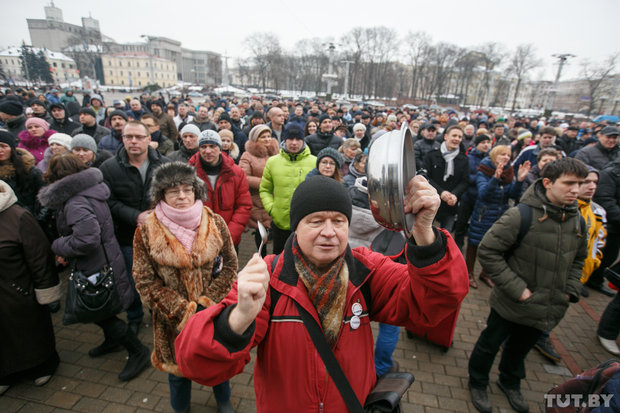How to Make Quick Money for the State: The Belarusian Solution

Photo: onliner.by
Belarus had a rough start to 2016 with the global drop in oil prices, causing instability in its currency and posing problems for its budget planning.
Yet instead of focusing on the IMF recommendations, the government appears to favour short-term solutions that allow it to generate immediate revenue for the state budget.
In 2015 the government introduced a range of new regulations, including the infamous tax on “social parasitism.” Limitations on cross-border duty-free goods allowances and postal parcels from abroad followed in 2016.
New measures, including stricter control over the occasional business activities of the population, came as a surprise and stirred up discontent in society. They directly impact the lives of ordinary Belarusians, forcing them to show more interest in politics.
Fighting tax evasions
According to the Minister of Tax Collection Siarhiej Nalivajka, in 2015 the Belarusian tax system generated more than 70 per cent of state revenues. This is less than in 2014 and 2013, when these figures were 86 per cent and 87 per cent respectively. The minister noted the need to improve monitoring of business operations to encourage more payments.
In the past month the Belarusian tax inspection service has followed this advice and tightened controls over the “illegal business activities” of the Belarusian population. This broad definition includes everything from occasional private sales advertised on online platforms such as craigslist, to entrepreneurs who violate standard procedures.
Several recent publicised cases involve undercover tax inspectors posing as potential customers in the notorious “control deals.” One offender caught in this manner was Aliaksandr Makaeŭ, owner of a business selling plumbing equipment and an activist of the entrepreneurs’ protest movement. For him, the sale of a faucet turned into a fine for incomplete certification documents and a failure to provide a receipt.
These tactics by the authorities target tax evasion and aim to secure fair conduct of business. However, at the same time they affects the lives of ordinary Belarusians who are trying to make some extra money on the side. In December 2015, several Santa Clauses fell victim to charges of unregulated business activities in Homiel’. In Minsk people had to pay fines for selling kittens and puppies and failing to report the income to the authorities.
Eliminating “social parasitism”
On 2 April 2015, President Alexander Lukashenka signed decree No. 3 “On the Prevention of Social Dependency,” otherwise known as the “tax on parasitism.” It is one of the innovations of the Belarusian tax system, reminiscent of the infamous Soviet practices of the 1960s.
In the Belarusian case, “social parasites” are persons who do not participate in financing state expenditure, yet enjoy the benefits of the social state, including free education and medical services. Anyone who does not work for more than 183 calendar days in the year and who fails to register as officially unemployed has to pay the state a sum of about $190.
The implementation of the decree remains unclear, as there are numerous categories of tax exemptions. The Belarusian Tax Ministry announced that it would prepare a comprehensive list of “social parasites” by 1 August 2016, since currently only 820 persons have voluntarily reported to the authorities.
The end of shopping tours era?

On 11 February 2016, Lukashenka signed decree No. 40 on regulating imported goods. In particular, new rules for monthly parcels from abroad limit their total duty-free value to €22 and their weight to 10kg. By contrast, the previous duty-free monthly limit, in effect since 2014, allowed for 31kg of a total value of €300.
This measure will undoubtedly affect online shopping in China, which recently became quite popular among Belarusians. According to the State Customs Committee, more than 250,000 Belarusians made online purchases in 2015, with the average number of parcels from abroad ranging from 10 to 100 per person.
Moreover, to prevent the import of goods for commercial use, the new decree introduced tighter limits on frequent travelers abroad. Currently, the duty-free allowance is set at 50kg and at a total value of €1,500 per person. However, those who cross the border more often than once every three months will be able to transport goods of a total value not exceeding €300 and weighing no more than 20kg.
In reality, these new regulations will most likely have an impact on those Belarusians who prefer shopping abroad, attracted by lower prices and better quality. VAT tax returns on such purchases make this option even more attractive. Shopping tours to Białystok malls in neighbouring Poland have already become a distinctive feature of the Belarusian travel market.
A chance for the Belarusian opposition

Discontent caused by the tighter regulations offers a chance for the Belarusian opposition to work on its current marginalised image. Re-establishing the link with society over the unpopular measures might also energise the reshaping process within the opposition.
Former presidential candidate and political prisoner Mikola Statkevič already made use of this opportunity, accusing the president of “robbing the ordinary people” and depriving them of consumer choices.
The recent entrepreneurs’ protest in Minsk on 15 February gathered between 500 and 1000 people. Among them were opposition activists Mikola Statkevič, Anatol’ Liabedz’ka, Uladzimir Niakliaeŭ, and Paval Seviarynec. The protesters demanded that the authorities revoke decree No. 222, which prohibits trade with goods without certification and affects the small traders.
It appears that Lukashenka has recognised the dangers of popular dissatisfaction. On 16 February he criticised the government, warning against “destabilising the situation in the country.” At the same time, the regime has started monitoring contact between the opposition and entrepreneurs. On 19 February, the authorities detained opposition activist Viačaslaŭ Siŭčyk together with Aliaksandr Makaeŭ in Svetlahorsk, where they organised a meeting with local entrepreneurs to discuss decree No. 222.
So far the benefits of the new regulations and tax innovations remain debatable. At first sight, they alleviate some of the budget constraints. Yet they also emphasize short-term solutions at the expense of the population, harming the image of the social state. Finally, they make the Belarusian regime more economically vulnerable.




